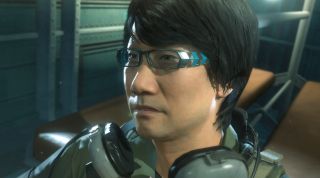

Samuel Roberts, Editor is a faceless cog in the machine, but demands that his face be at the front of the magazine every month.
Andy Kelly, Section Editor thinks games need bold auteurs leading the project, otherwise they’ll increasingly become a sad beige slurry.
In Face Off, PC Gamer writers go head to head over an issue affecting PC gaming. Today, Sam and Andy argue about who deserves credit when great games get made.
Andy Kelly: YES. All great art is the result of an unflinching creative vision, and games should be the same.
Sam Roberts: NO. Games are collaborative, and praising just one person doesn’t make a lot of sense.
AK: When Ridley Scott was making Blade Runner, everyone hated him. He made the cast and crew endure hours of gruelling takes on dark, rainy, foggy movie sets, and people would routinely quit the production. And the results speak for themselves. Scott had a bold, unwavering creative vision for the film and, even though it pissed a lot of people off, it resulted in a genuine masterpiece. That’s what games need. They need someone who won’t compromise to appease the suits, and who doesn’t design by committee.
SR: There are some games where that’s seemingly been the case, like Ken Levine at Irrational on the BioShock series—he’s a fairly famous example. But at its height, over 100 people were working at Irrational—and creative vision is as much about course correction as it is about seeing it through. BioShock Infinite went through six years of development and, while Levine was lead writer, four others are credited on the writing of that game. Studio culture and the way it informs the finished product is way more powerful than the influence of one individual. Filmmaking has a much more direct power structure that relies on the vision of the director. Games are too complicated for that to work the same way.
AK: Making games is a complex process, no doubt. But when you look at something like Metal Gear Solid, Hideo Kojima’s presence is felt in every scene. Even though attributing the series’ brilliance exclusively to him is unfair to all the talented artists and coders who make his mad fever dreams a reality, they’re still guided by his hand. Kojima is enormously respected and influential at Konami, and a rarity in the industry, but I’d love to see more of that. When publishers start meddling in game development, you end up with stuff like the microtransactions in Assassin’s Creed Unity. Having a Kojima or a Scott at the top of a project is the best way to keep their dirty, money-grubbing poison away from the art.
SR: Hey, I make an exception for Kojima. His games are so confidently bizarre that I can’t possibly think how you would get those results in any other way. He does come from an era of smaller teams, though—he’s been a fixture for a while, as has anyone we consider or have considered an auteur in the games industry, like Levine or Peter Molyneux. It’s proportional relevance. Could you really see someone attaining that status out of a modern studio with 100-200 people in it? It’s a little different with indie studios, where the team sizes mimic the earlier days of games development. But even then—auteur? Really? It’s a bit highfalutin as terms go for Bloke Who Does Press Interviews or Stage Demo Figurehead. Those are more relevant job titles, Andy. Every studio should have those two people instead.
PC Gamer Newsletter
Sign up to get the best content of the week, and great gaming deals, as picked by the editors.
AK: Auteur is a bad word to use. Anything French sounds pretentious, like raison d’être or croissant. A Levine or a Kojima takes years to develop, and is usually the result of them making a hit game. But what studios should do is actually hire someone whose job is being the creative driving force behind a project. Their word is law, and everything goes through them for approval. Like an artistic dictatorship. That’s how Ridley Scott made Blade Runner amazing, and I think developers would massively benefit from having someone like that to answer to. Will it ever happen? I doubt it. Not when the suits are there waving their spreadsheets. But it should, because it stops games feeling like cynical cash grabs. AC Unity felt like a product to me, in the way, say, a Stanley Kubrick film doesn’t. I know I’m living in a naive fantasy world, but I like it here. Leave me alone.
SR: So you’re comparing auteurs to croissants now? Why not just hire a senior croissant consultant and do away with auteurs altogether? Or a chief creative raison d’être? They can drive the creative direction of this industry—who needs auteurs when someone has croissant in their job title? I think I’ve won this one.
AK: Look, I know I’ve spent several pages this issue talking about Blade Runner, but what games really need are genetically engineered super-developers who are made up of the best bits of legendary directors. A bit of Kojima, a bit of Levine, a bit of Mikami, a bit of Molyneux. There’s always a chance they could go rogue and turn murderous, but then I’d get to put on a trenchcoat and hunt them down in a cyberpunk city as Vangelis follows me around playing a synth.
Hey folks, beloved mascot Coconut Monkey here representing the collective PC Gamer editorial team, who worked together to write this article! PC Gamer is the global authority on PC games—starting in 1993 with the magazine, and then in 2010 with this website you're currently reading. We have writers across the US, UK and Australia, who you can read about here.

